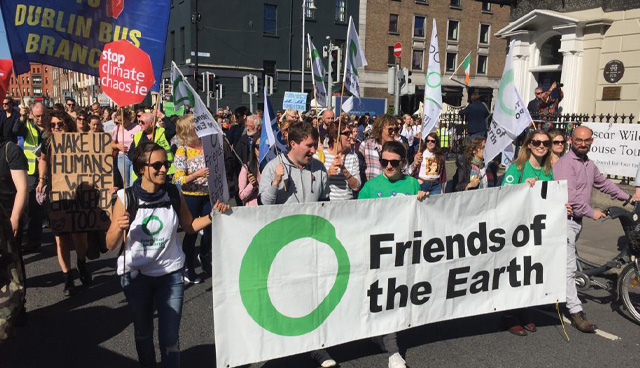The case for a just transition

The Nevin Economic Research Institute’s (NERI) quarterly economic observation report for winter 2019 focuses on the need for a “just transition” to protect workers, the communities in which they live and work, as well as the environment.
A “just transition” is the idea that the workers and communities at-risk from the industrial and economic change necessary to combat climate disaster should not be disproportionately affected by the inevitable adjustments. In its latest report, NERI says that the Irish Government should “enact measures to support workers to find decent work in new green industries, and measures to protect communities reliant on employment facing obsolescence”. This recommendation is especially pertinent in Ireland, which NERI calls a “laggard on many indicators of sustainability”.
The report finds that the brunt of the transition will occur in six sectors, which account for 88 per cent of emissions despite only accounting for 9 per cent of employment: crop and animal production, hunting and related service activities; air transport; electricity, gas, steam and air conditioning supply; manufacture of other non-metallic mineral products; land transport and transport via pipelines; and manufacture of basic metals. This presents a challenge outside of Dublin especially; NERI research found that while 85 per cent of national employment growth between quarter two 2012 and the same quarter of 2019 were in “low-emitting” sectors, this figure fell to less than 70 per cent in the south west and midlands regions.
The transition will have implications for skills capacity across the economy, but the challenge most commonly faced when strategising for that transition is that green skills can be hard to define; various studies have suggested that skills in science, engineering and mathematics will be priorities. The report warns of a “structural mismatch in the Irish economy’s skill base, including over-qualification, horizontal mismatch and, among the potential labour force, underutilised skills”. NERI data shows that 30.6 per cent of people in Ireland with tertiary education qualifications are working in unrelated fields, a figure that rises to 39.2 per cent for those with tertiary education qualifications in the key area of science, mathematics and computing.
NERI suggest that the Government deploy or redeploy people with existing skillsets that aren’t being fully utilised using “an appropriately designed programme of public investment” in the short term. They note that international exemplars indicate the best course of action involves agreed timelines between trade unions, employers, communities and governments.
Long-term planning with communities and unions should enable wind-downs for jobs that are no longer tenable and limit the disruption and dislocation that workers prospectively face. This would also allow government and industry to upskill workers and ensure regional investment in non-carbon intensive sectors. Trygghetsråden, Swedish job security councils, are cited as an example to follow; through coaching, counselling and training on an individualised basis, these councils have attained success rates of between 80 and 90 per cent for job placements within eight to 10 months, with 80 per cent returning to work at a similar or higher paid job.
The report concludes by recommending the introduction of a framework “that incorporates high-level direction and aggregate planning with local participation by affected actors” and that the Government addresses the “endemic shortfalls in social insurance payments in Ireland” in order to “provide resources for more comprehensive social protections to minimise worker and regional dislocation and fund upskilling”.





